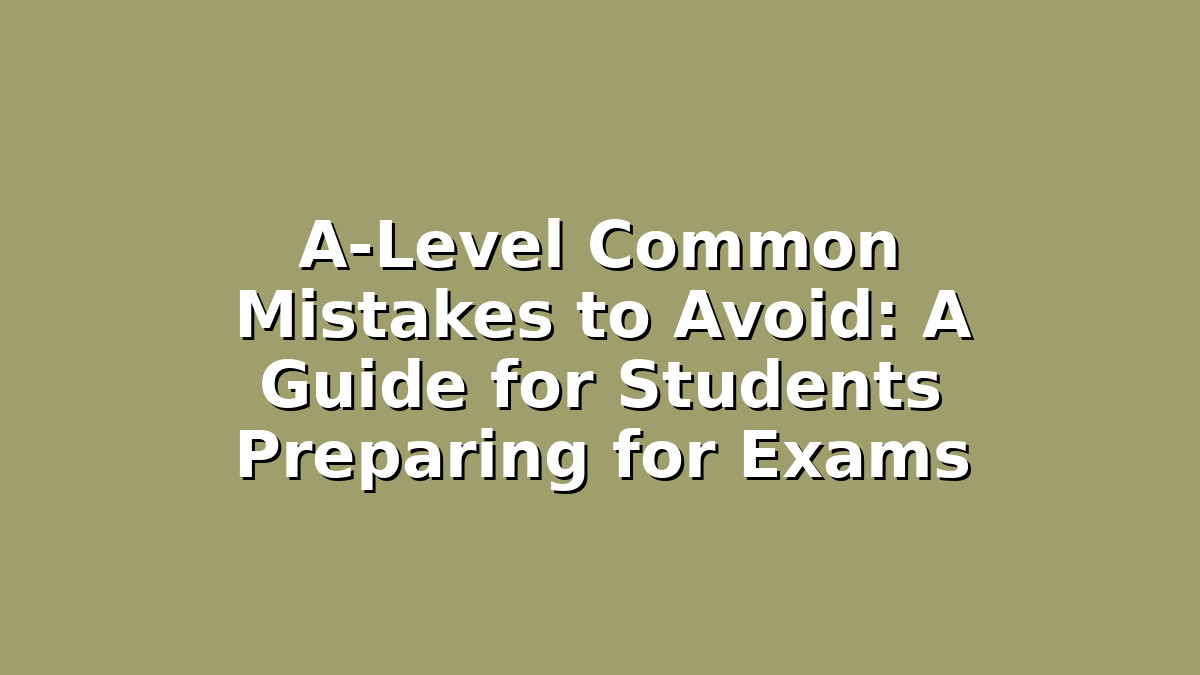Preparing for A-Level exams can be a challenging and stressful experience for many students. With high expectations and a vast syllabus to cover, it’s easy to make mistakes that could affect your performance. However, by being aware of common pitfalls, you can better prepare yourself to succeed and achieve the grades you want. This guide will highlight some of the most frequent mistakes students make during their A-Level studies and offer practical advice on how to avoid them. Whether you’re just starting your revision or are in the middle of exam season, these tips will help you maximize your potential and reduce unnecessary stress.
1. Poor Time Management and Procrastination
One of the biggest challenges A-Level students face is managing their time effectively. Many students underestimate how much revision is needed and delay starting until the last minute, leading to cramming and burnout.
Why It Happens:
It’s natural to put off work that feels overwhelming or boring. Additionally, distractions from social media, friends, or extracurricular activities can eat into study time without you realizing it.
How to Avoid It:
– Create a Realistic Revision Timetable: Break down your syllabus into manageable chunks and assign specific topics to each day. Use tools like calendars or apps to plan your study sessions.
– Set SMART Goals: Specific, Measurable, Achievable, Relevant, and Time-bound targets will keep your revision focused and purposeful. For example, “Complete all A-Level Chemistry organic chemistry notes by Wednesday” is better than “Study chemistry.”
– Use the Pomodoro Technique: Study for 25 minutes, then take a 5-minute break. Repeat this cycle to maintain concentration without exhaustion.
– Limit Distractions: Keep your phone on silent or in another room while studying and use website blockers if necessary to avoid social media.
– Start Early: Even reviewing a small amount regularly is better than cramming. Starting early allows more time for difficult topics and practice exams.
2. Neglecting Understanding in Favor of Memorization
While memorizing facts is important for some subjects, relying solely on rote learning can be detrimental. A-Levels often require critical thinking, application of knowledge, and problem-solving, which cannot be achieved through memorization alone.
Why It Happens:
Students sometimes believe that cramming facts will guarantee success or feel pressured to cover as much content as possible without really grasping it. This approach can lead to confusion during exams, especially for questions that require explanation or analysis.
How to Avoid It:
– Focus on Conceptual Understanding: Spend time making sure you understand the fundamental principles behind each topic. For example, instead of just memorizing formulas in maths or physics, try to understand how and why they work.
– Use Active Learning Techniques: Summarize information in your own words, teach concepts to a friend or family member, or create mind maps to visualize connections between ideas.
– Practice Application Questions: Use past papers and exam-style questions to apply what you’ve learned. This helps identify weak spots and improves your ability to think critically under exam conditions.
– Ask for Help: If something isn’t clear, speak to your teachers, tutors, or classmates. Don’t leave gaps in your understanding.
– Use Multiple Resources: Sometimes, textbooks or class notes may not be enough. Supplement your revision with videos, online courses, or revision guides that explain topics differently.
3. Ignoring Exam Technique and Question Interpretation
Many students spend a lot of time revising content but neglect the importance of exam technique. Understanding how to approach questions, manage time in the exam, and structure your answers is crucial for maximizing marks.
Why It Happens:
Students often assume they know how to take exams or focus solely on recalling information without practicing how to communicate it effectively. This can lead to losing easy marks due to misreading questions or providing incomplete answers.
How to Avoid It:
– Practice Past Papers Under Timed Conditions: This familiarizes you with the format, question styles, and time pressure of the actual exam.
– Learn to Analyze Questions Carefully: Pay attention to command words like “explain,” “compare,” “describe,” or “evaluate,” which tell you what kind of answer is expected.
– Plan Your Answers: For longer essay-type questions, spend a few minutes outlining your points before writing to ensure your answer is clear and organized.
– Show Your Working: In subjects like maths or science, even if you don’t get the final answer, showing your working can earn you partial credit.
– Review Mark Schemes: Understand how examiners award marks so you can tailor your answers to meet their criteria.
– Don’t Leave Questions Blank: If you’re unsure, try to write something relevant — partial knowledge is better than none.
Conclusion
A-Level exams represent a significant milestone in your academic journey, but they don’t have to be overwhelming. By managing your time wisely, focusing on understanding rather than memorizing, and honing your exam technique, you can avoid common mistakes that trip up many students. Remember, preparation is a marathon, not a sprint; consistent effort and smart strategies will pay off. Stay positive, seek support when needed, and keep your goals in sight. With the right approach, you can confidently tackle your A-Levels and open doors to exciting opportunities ahead.
Good luck with your revision!

Responses